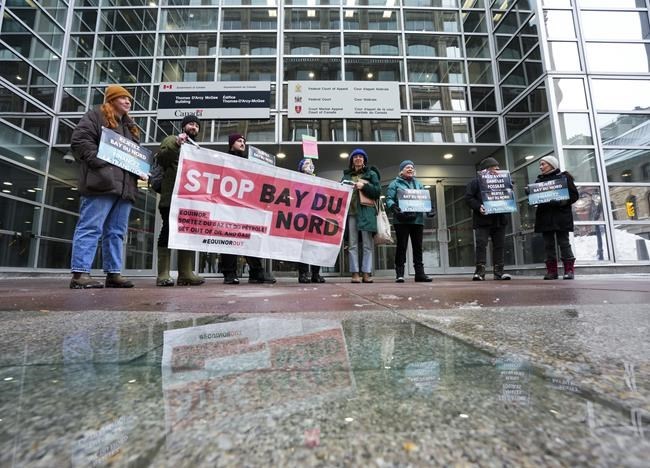
The Sierra Club Canada Foundation and the Council of Canadians demonstrate in solidarity against the Bay du Nord Oil Drilling Project outside Ottawa Federal Court in Ottawa on Wednesday, March 1, 2023. A lawyer representing the Norwegian energy firm behind a proposed offshore oil project in Newfoundland and Labrador insists the company is only responsible for the immediate environmental impact of the project itself.THE CANADIAN PRESS/Sean Kilpatrick
Republished March 02, 2023 - 2:25 PM
Original Publication Date March 02, 2023 - 8:26 AM
OTTAWA - A Federal Court judge could determine whether oil and gas projects must be assesses for environmental impacts related to the shipping and end-use of their products, on top of those resulting from production.
That is a central question in a legal challenge of the federal government's authorization of the Bay du Nord offshore floating oil project proposed for an area in the North Atlantic Ocean 500 kilometres northeast of St. John's, N.L.
Equinor, the Norwegian state energy firm proposing Bay du Nord, hasn't yet confirmed it will proceed with the project. If it does, it is expected that it will produce at least 300 million barrels of oil, and possibly more than three times that much, over a 20- to 30-year period.
Environment Minister Steven Guilbeault approved the project in April 2022 following an Impact Assessment Agency review and environmental assessment.
Sean Sutherland, a Calgary-based lawyer representing Equinor in the case, argued Thursday that the company cannot be held responsible for things outside its control, particularly because the company doesn't know where the oil is going to be shipped or how it will be used.
"Equinor has no idea what the shipping routes are going to be because they have not been selected," Sutherland said. "They don't know where the oil is going."
He said assessing the emissions produced when the oil is used, usually called the "downstream" emissions, would be impossible when Equinor does not yet know who will to buy it.
"We don't know what the downstream uses will be," Sutherland said.
But two Ecojustice lawyers said an environmental assessment of a fossil fuel project must account for the full environmental impact from the moment they're pulled out of the ground until the time they are used.
In this case, argued Anna McIntosh, neither Guilbeault nor the Impact Assessment Agency even considered whether the downstream emissions were harmful to the environment.
"But for the project there would be no downstream emissions so it is impossible to say that downstream emissions are not an environmental effect of the project," McIntosh said.
She also said the project is not in keeping with either Canada or the world's interest in reducing greenhouse gas emissions to slow global warming.
Guilbeault, a former environmental activist who used to rail against new fossil fuel projects, has described the decision to approve Bay du Nord as one of the hardest of his life.
But the government insists this project is in line with its climate goals, in part because there are uses for oil that are not related to energy.
Natural Resources Minister Jonathan Wilkinson has said by 2050, demand for oil will almost entirely be for non-combustion activities, including solvents, lubricants and petrochemicals.
The federal approval of the project is being challenged in court by the Sierra Club Canada Foundation, Équiterre and Mi'gmawe'l Tplu'taqnn Inc., which was the consultant of record for eight New Brunswick Mi'kmaw communities.
Mi'gmawe'l Tplu'taqnn also argues that the government failed in its duty to consult over the impact of marine shipping in North Atlantic Ocean waters that are in its traditional territory.
Government lawyer Dayna Anderson said the government did consider marine shipping and fully discharged any duty to consult as it related to the project itself. But she said there is no territorial or treaty land claim to the specific area where the project will be located.
The environment groups and Mi'gmawe'l Tplu'taqnn have asked the judge to overturn the federal authorization and ask the government and the Impact Assessment Agency to include downstream emissions and all marine shipping in their evaluations.
Justice Russel Zinn said there has been so much evidence presented in the case it will take him some time to reach a decision.
This report by The Canadian Press was first published March 2, 2023.
News from © The Canadian Press, 2023